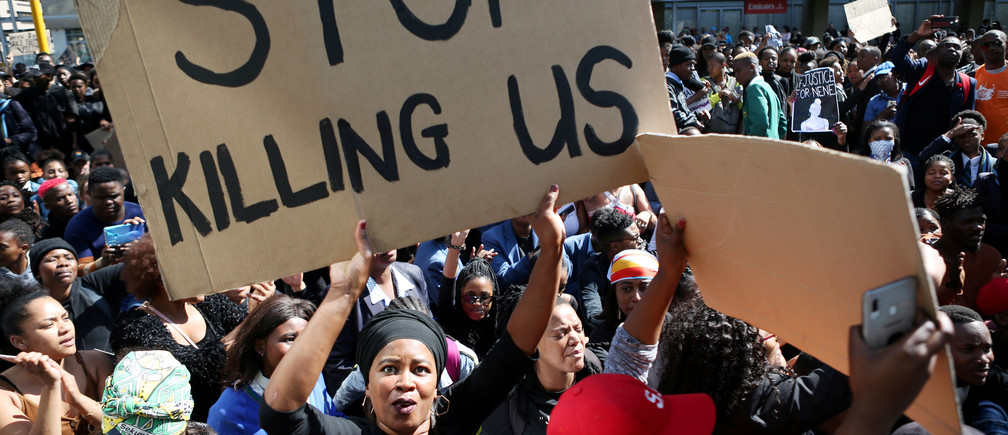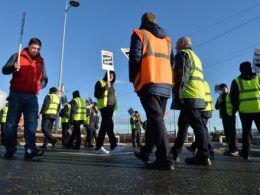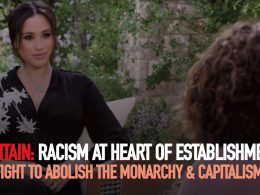“Woman, life, freedom” – This is the main slogan the masses in Iran have been shouting on the streets after the brutal killing of 22-year-old Jina (Mahsa) Amini. From Kurdistan to Azerbaijan, from Sistan and Baluchestan to Khuzestan – this movement has shaken the entire country and beyond. The protests triggered by state femicide immediately turned into a brave revolutionary uprising against the whole regime in Iran, taking up the issue of femicide and state violence as well as the whole oppressive system of women, Kurdish people and other minorities, youth and workers suffer from.
Jina’s life was taken by the so-called “morality police” in Iran. This force is a symbol of the daily control over women’s bodies, the arrests, harassment & violence the masses are not accepting anymore. The oppressive dress codes, the rising attacks on women and the LGBTQI+ community in Iran, for instance, the recent death sentence against two well-known LGBTQI+ activists, have been a key pillar of power for the regime. The united struggle that has developed since September, taking up the fight in every sphere of Iranian society – in schools, workplaces, neighbourhoods, on the streets, in the homes – is hitting the system in its heart. These women have inspired broader layers of the working class to rise up too – in a statement published by sugar factory workers in Iran they state that:
“Girls of the sun and of the revolution; on the day of victory, the whole world will take off their hats in front of you – you gave everyone a lesson in standing up and resisting”
The revolutionary movement in Iran shows once more how deeply misogyny, violence and sexism are interlinked with state violence, repression and the entire capitalist system. The fact that this movement is taking up the fight against one of the most oppressive and repressive dictatorships in the world shows the unbreakable bravery of an entire generation. Women and girls in Afghanistan have been protesting from the very first moment against the Taliban regime – and recently, inspired by the movement in Iran – went again on the streets after the horrific bomber attack against Hazara students.
This movement is a hugely inspiring example of solidarity among the oppressed. “Woman, Life, Freedom” reflects the worldwide struggle against femicide and gender-based violence we have already seen in many places around the world in recent years. It shows how uprisings, triggered by one spark, one extreme example of the daily oppression and violence women & LGBTQI+ face, quickly turn into a radical movement challenging brutal dictatorships and, to an extent, the system as a whole. The heroic women, girls, workers and youth in Iran show us the path for our struggle against violence and oppression.
International solidarity has been a key feature of feminist and other movements in recent years: It reflects the mood that an injury to one is an injury to all. From #MeToo to Black Lives Matter (BLM) and Ni Una Menos: The daily violence has been answered with radical action and solidarity. Thus we saw in July also a cross-border day of action in the Middle East and North Africa against femicide. We need to take exactly these types of movements against gender-based and state violence even further to build an international, socialist feminist movement against every form of oppression and exploitation. We need to turn this year’s day for the elimination of gender-based violence into a day of mass action against the
attacks on our rights, the rise of violence, war and imperialism, the cost of living crisis and the capitalist horror we go through.
The rise in gender-based violence & the role of the state
Since the uprising in Iran started, hundreds have been killed and arrested by the security forces. The average age of the arrested protesters is 15 years. Young school students have been attacked by the police inside their classrooms. University students have “disappeared” and the state forces have used brutal violence and rape to break the movement and the women. But even this massive repression and state violence couldn’t stop the movement.
As already illustrated in recent revolutionary uprisings from Chile to Sudan – it has become very clear how violence and rape is consciously used by the ruling class and the state. State violence and femicide are increasing when the ruling class has to fear a revolution. Dictatorships like the Iranian regime are the clearest reflection of the interconnectedness of the capitalist state and interpersonal, gender-based violence. But we can see this interconnectedness everywhere: The state is complicit in oppressing & violating women & LGBTQI+ in many different ways. It has become clear for many people that in a system in which the state is such a perpetrator we will never have full equality and end gender-based violence.
It is about the daily victim-blaming and slut-shaming – from police officers to the courts. It is about the deep links of the state with religious institutions – may it be the Catholic church or the Ayatollahs and the conscious promotion of deep-seated misogyny and sexism. It is about the entire state-apparatus protecting the wealth and property of a small super-rich minority rather than the lives & rights of us all. The capitalist state is an instrument of the ruling class – it is not a neutral institution. It is inherently built to defend the status quo. This has become crystal clear during the BLM uprising as well as through some of the most shocking cases of femicide like the murder of Sarah Everard in the hands of a police officer.
While these cases are some of the most extreme examples of gender-based violence, we know that most of the cases of femicide and violence take place in the homes – further increased during the pandemic and now the economic crisis. Violence against women is not only physical, often women have been subjected to a long period of controlling behaviour, which also manifests itself in psychological violence and for instance the loss of control over their own finances.
Abuse and violence against women is part of maintaining the power imbalance between men and women, as is the control over women’s bodies. The state in capitalist society has no interest in countering this; on the contrary, the division between working women and men is a cornerstone of the system.
At the same time, cuts in services, shelters, healthcare and education have further increased economic dependence for women. Dangerously isolated in their homes, women, girls & LGBTQI+, for instance, youth are increasingly losing the means to leave a violent partner/families etc. The multiple crises the capitalist system creates – from the devastating floods in Pakistan to the energy crisis – hit the most oppressed even harder and increase every form of violence.
Offensive of the far-right & the ruling class – Abortion and queer rights under attack
Another form of state violence are the dangerous attacks on bodily autonomy and some of our most basic rights. The attack on Roe V. Wade has been a turning point this year, one state after another in the US is bringing in abortion bans – threatening the lives of millions of women and pregant people.
This right-wing offensive inspired the far-right and cynical “pro lifers” around the globe, from Hungary to Italy to Germany and Austria. These attacks go hand in hand with attacks against the LGBTQI+ community and trans people in particular. The ruling class is aware that the growing self-confidence and radicalization of particularly young women and queers is a threat for their rigid gender norms and the nuclear family the system needs to oppress and exploit not only women but the entire working class.
In that sense, these attacks are also an ideological offensive against the rising feminist movement around the globe. The hypocrisy of the far-right, talking about “pro life” while voting against state intervention to resolve the baby formula crisis in the US or being responsible for the killing of refugees at the European borders is useful for the capitalist system. These ideologies lead to extreme violence and murder – from the backlash against metoo in the face of the Johnny Depp and Amber Heard trial to the dangerous impacts of figures like Andrew Tate. On the 12th of October, a 19-year-old man attacked an LGBTQI+ bar in Bratislava and killed two men. Before the attack, the perpetrator had published a far-right, anti-queer manifesto. These attacks we also saw in Oslo, in Colorado, and at several pride events this year are an escalation of the oppression that queer people suffer from every day.
It is about policing our lives and bodies. The attacks on abortion rights in China are a clear example of that, with their radical turn from the one-child policy to abortion restrictions. They clearly push these attacks in the context of growing imperialist wars and crises – in order to control when and if we should give birth to children. Abortion bans are an example of state violence, they mean life-threatening situations not only for women who want an abortion but for everyone who can or wants to get pregnant as well. These restrictions are ultimately a class question: working women & poor are mainly affected while the rich have no problems in accessing the necessary health care they need.
From Iran to the US we fight for full bodily autonomy as a central issue in our struggle against gender-based violence. For full, free access to every type of health care we need. The different, inspiring struggles of healthcare workers around the world for decent wages and better working conditions show us where our power lies: We have to link these struggles to the struggle for bodily autonomy and remember how we were able to win real victories.
Because this offensive of the conservative and far-right is only one side of the coin. The other side is the important victories that have been won from Ireland to Argentina, from Mexico to South Korea. ROSA and the Socialist Party in Ireland played a key role in winning abortion rights in Ireland and took the initiative to remember how this victory was won with a march at this year’s 10th anniversary of the tragic death of Savita Halappanavar: Through organizing & mobilizing the working class from below and taking a bold approach, organizing
the distribution of abortion pills in a large scale to bring the state under enormous pressure and to expose the reality of abortion restrictions.
War and imperialism: Violence in its purest form
UN women published a report on the 20th of October stating that:
“Military spending has reached an all-time high of 2.1 trillion in 2021, coming at the expense of investments in human security. At the same time, and when needed the most, funding for women’s organizations in conflict-affected countries has gone down to $150 million in 2020, compared with $181 million in 2019.”
The criminal invasion of Russia in Ukraine reached a new escalation in September with the “partial mobilization”. Since the beginning of this war thousands of civilians have been killed – many more have been forced to leave their homes. Ukrainian and Russian soldiers are being killed in a war that has thrown the whole world into shock and fear.
Wars are the most pure form of violence in the capitalist system. The war in Ukraine is only one example of dangerously growing imperialist tensions and militarization. And it’s always women, the most oppressed, working class and poor that have to pay a heavy price for their wars. But they are also the ones resisting: Women have been at the forefront of protests in Russia against the war despite massive repression by the Putin regime.
War means brutal violence, hunger and destruction – as well as a rise in gender-based violence. Rape is used as a weapon in every war. Ukrainian women and girls have been victims of trafficking like all refugees on a massive scale. When men come back from frontlines of war, it means an even higher rate in domestic violence and femicide.
“Who profits from this war?” – Our struggle against gender-based violence cannot be separated from our actions against imperialism and war. From the very first moment of this war, we have campaigned with ROSA and the ISA to build an anti-war movement with a socialist-feminist approach – pointing to the power of ordinary people and all oppressed to end this war through struggle.
Cost of living crisis = crisis of capitalism. We won’t pay with our lives, bodies and health!
“There are many ways of killing. Stick a knife in someone’s stomach, take someone’s bread away, not cure someone’s illness, put someone in poor accommodation, work someone to death, drive someone to suicide, take someone to war. In our country some of this is forbidden.” (Bertolt Brecht)
The war in Ukraine is also used by the ruling class to fully explain the massive cost of living crisis, inflation, food shortages etc. In reality, the economic crisis had already started before the war. The energy crisis now is a massive threat to the lives of millions of people around the globe.
In Iran inflation in September was at 75%. Populations in 44 states are currently experiencing ‘alarming’ levels of hunger, 828 million people are malnourished – many of whom are children. This winter, gender-based violence will dramatically rise again since we know how economic crises lead to a rise of violence – freezing temperatures in the homes will lead to dangerous infections and health problems – not to mention the fact that a new COVID wave will worsen the situation. In addition to poverty and hunger, the cost of living crisis will also mean an escalation in the homes and families, with growing tensions, violence and therefore rising femicide rates. The unpaid care work of women the capitalist system needs and profits from will further expand and put multiple pressures on women who are often the ones responsible for preparing and buying food for the family.
We know that inflation is not a law of nature: At the same time, while we are struggling to pay our bills and have to fear homelessness and hunger, energy companies have made record profits. Exxon alone reported for 2022 a profit of $17.9 billion – Saudi Arabia’s Aramco made $48.4 billion in the same quarter! They want us to pay for their crisis. An overwhelming number of women work in essential sectors, so the pandemic put them at the frontlines. Now inflation is forcing them to the breadlines. These are all forms of violence in the capitalist system.
This is why the struggle against gender-based violence goes hand in hand with taking up the fight against this profit-driven system that produces all these multiple crises we have to suffer from. It means that the working class movement internationally, like the trade union movement when it takes up the fight against the cost of living crisis, needs to put demands centered around the struggle against gender-based violence, sexism and oppression at the central stage. For example using wage negotiations & mobilizations against the cost of living crisis to link it to the struggle for bodily autonomy, women’s and queer rights.
Build the socialist-feminist fightback now
The revolutionary movement in Iran indicates how women at the forefront of struggle, the working class, poor and oppressed have the power to overthrow dictatorships, and potentially even the profit driven system of capitalism – which is the only way to end the spiral of crisis after crisis and the different forms of violence linked to that.
This system is guilty in every aspect – in order to end gender-based violence and to make the slogan “Ni una menos” (“Not one less”) a reality, we have to fight for a completely different society. Gender-based violence is an expression of a deeply violent system. Now is the time to mobilize & organize around the 25th of November and to build a socialist-feminist movement in our workplaces, schools, universities & communities:
● to end every form of gender-based violence, fight sexism, misogyny, racism, LGBTQI+ phobia, abuse, harassment and oppression everywhere
● to defend and expand abortion rights and gender-affirming health care – full and free access, fight for secular and fully funded sex education and free and easy access to contraception
● to fight for fully funded domestic and sexual violence services, women’s and LGBTQI+ shelters as well as mental health services
● to win living wages, affordable housing and decent jobs, to fight the massive increase of hunger and poverty and to make an independent live possible
● to fight for mass investments in healthcare, education & public housing, expropriate the profit-making housing companies
● to seize the wealth of the elite and super-rich to fund these necessary measures ● to nationalize energy companies, the food industry and other key industries around the world under the democratic control of the working class in order to end the freezing in the homes and the energy crisis, and to fight the climate crisis
● to fight for a state that is democratically governed by the working class and poor from below to eliminate the basis of oppression and discrimination in the state and the judicial system
● to fight for a socialist alternative to capitalist barbarism, to plan and control the economy, resources and society democratically for the needs of humans & nature, not for profit, to end oppression, violence and exploitation once and for all












